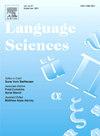Third-way linguistics: generative and usage-based theories are both right
IF 1.1
2区 文学
Q2 EDUCATION & EDUCATIONAL RESEARCH
引用次数: 0
Abstract
Language research remains largely affected by the generative grammar vs usage-based rivalry. The polarization is so pervasive that one seems to have no choice but to assume that language categories are either entirely innate or fully learned. Nonetheless, it is possible to refrain from taking a side in the generative vs nongenerative debate. This paper highlights the work of authors over the last thirty years who believe that, on the one hand, input and domain-general, cognitive constraints alone are insufficient to learn and represent a language and, on the other, that the faculty of language (FL) – if it exists – must incorporate statistics, i.e., a counting device. The core idea of ‘third-way’ linguistics described in this paper is that languages can work because language users' statistical sensitivity and their innate grammar module interact. For a language to function, language users must implicitly know two things. First, by accumulating experience and memory, language users come to know that some forms are likely to go together in the input. Second, from a frequency-independent device (the FL) they also know in abstract (i.e., prior to input exposure) why those forms and not others can do so.
第三语言学:生成理论和使用理论都是正确的
语言研究在很大程度上仍然受到生成语法与使用语法之争的影响。两极分化如此普遍,以至于人们似乎别无选择,只能假定语言类别要么完全是天生的,要么完全是后天学习的。尽管如此,我们还是有可能在生成语法与非生成语法的争论中避免站队。本文重点介绍了作者们在过去三十年里所做的工作,他们认为,一方面,仅凭输入和一般领域的认知限制不足以学习和表述语言;另一方面,语言能力(FL)--如果存在的话--必须包含统计,即一种计数装置。本文所描述的 "第三条道路 "语言学的核心思想是,语言之所以能够发挥作用,是因为语言使用者的统计敏感性和他们与生俱来的语法模块相互作用。要使语言发挥作用,语言使用者必须隐含地知道两件事。首先,通过积累经验和记忆,语言使用者逐渐知道输入中的某些形式很可能是搭配在一起的。其次,通过与频率无关的装置(FL),他们还能抽象地(即在接触输入之前)知道为什么这些形式而不是其他形式可以这样做。
本文章由计算机程序翻译,如有差异,请以英文原文为准。
求助全文
约1分钟内获得全文
求助全文
来源期刊

Language Sciences
Multiple-
CiteScore
2.90
自引率
0.00%
发文量
38
期刊介绍:
Language Sciences is a forum for debate, conducted so as to be of interest to the widest possible audience, on conceptual and theoretical issues in the various branches of general linguistics. The journal is also concerned with bringing to linguists attention current thinking about language within disciplines other than linguistics itself; relevant contributions from anthropologists, philosophers, psychologists and sociologists, among others, will be warmly received. In addition, the Editor is particularly keen to encourage the submission of essays on topics in the history and philosophy of language studies, and review articles discussing the import of significant recent works on language and linguistics.
 求助内容:
求助内容: 应助结果提醒方式:
应助结果提醒方式:


